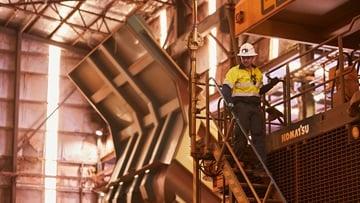
Gone are the days when premium car buyers simply looked for speed, style,
and luxury. Today, there’s increasing interest in the origin, sustainability
and emissions profile of the materials used to build their cars.
The new mantra for the high-end auto industry is “green is the new black.”
From the leather used for upholstery to the metals used for engine parts,
premium car buyers are increasingly demanding vehicles made from responsibly
sourced materials.
This fundamental shift in the automotive market has led to the creation of a
new, innovative partnership between Rio Tinto and the BMW Group, leaders in
their respective industries who share a common goal of developing more
responsible, sustainable, traceable and secure supply chains.
Under this new partnership, Rio Tinto plans to provide responsibly sourced
aluminium to the BMW Group’s vehicle production plant in Spartanburg, South
Carolina, for use in body components from 2024.
Low-carbon primary aluminium from Rio Tinto’s hydro-powered operations in
Canada, combined with recycled content, could generate a reduction of up to
70 percent in CO2 emissions compared to the BMW Group’s benchmark for
aluminium.
The two companies have signed a Memorandum of Understanding (MoU) which will
see technical experts working together on how to embed these low-carbon
solutions into the BMW Group’s supply chain while ensuring the highest
standards of vehicle quality are maintained. The partnership provides for
the use of aluminium produced using ELYSIS™ on BMW production vehicles.
ELYSIS™ is the world’s first carbon free smelting technology for aluminium
as it enables the production of aluminium metal without direct carbon
dioxide emissions during the smelting process, instead emitting pure oxygen.
Rio Tinto and the BMW Group will also work to deploy START from Rio Tinto.
START provides supply chain traceability to customers and consumers with
information about provenance and ESG standards.
Rio Tinto Chief Commercial Officer Alf Barrios said: “Rio Tinto’s
world-leading position in responsible aluminium production means we can
offer innovative solutions to our customers on their decarbonisation journey
toward net zero. As global demand for responsibly sourced materials
continues to grow, automakers are increasingly looking to partner with
suppliers who share their commitment to traceability and sustainability. Rio
Tinto is proud to play a role in helping to drive a greener future in the
premium car industry through this partnership with the BMW Group and we look
forward to deepening our ties with the automotive industry in the years
ahead.”
BMW AG member of the Board of Management, responsible for Purchasing and
Supplier Network, Joachim Post, said: “We have clear goals for lowering CO2
emissions in the supply chain. By using innovative materials, we can reduce
our vehicles’ carbon footprint – even before handing them over to customers.
The agreement to supply low-carbon aluminium is based on several pillars: in
addition to hydroelectric power and secondary material, we also want to lead
the automotive industry by ramping up our use of aluminium with no direct
CO2 emissions from the smelting process.”
The Honourable François-Philippe Champagne, Canada’s Minister of Innovation,
Science and Industry, said: “Canada is a global destination of choice for
low-carbon investment. This exciting partnership between BMW and Rio Tinto
is proof that Canada is well positioned to seize the economic benefits of
the clean economy. I am proud to see that low carbon Canadian aluminum will
be going into BMW’s vehicles. Canada will continue to enhance our
competitive advantages—abundance of critical minerals, skilled labour, clean
energy, proximity to markets—to grow our economy and to support
made-in-Canada innovation.”
ELYSIS is a technology company created through a partnership between
aluminium industry leaders Rio Tinto and Alcoa, with support from Apple and
the governments of Canada and Quebec. ELYSIS is scaling up a revolutionary
technology that enables the production of metal without direct carbon
dioxide emissions during the aluminium smelting process, instead emitting
pure oxygen. The technology uses inert anodes to replace the carbon anodes
traditionally used during electrolysis, the process used to make primary
aluminium. Learn more at www.elysis.com.
In 2021, Rio Tinto launched START, a new standard in transparency,
traceability and provenance for the aluminium industry. Using secure
blockchain technology, START provides key information about how Rio Tinto
aluminium was made, covering fourteen criteria: global warming potential,
water management, waste management, energy sources, air emissions,
biodiversity, land management, recycled content, safety performance,
community investment, third-party assessments, ethics and compliance
training, diversity in leadership and Rio Tinto’s whistleblower programme.
Through START, Rio Tinto empowers its customers and theirs to make a more
sustainable choice.










More Stories
Auto Repair Services: Keeping Your Vehicle Road-Ready
Unleashing Creativity with Vidnoz: The Best Free AI Video Generator in 2025
The Connection Between Air Drying and Energy Efficiency in Industrial Settings